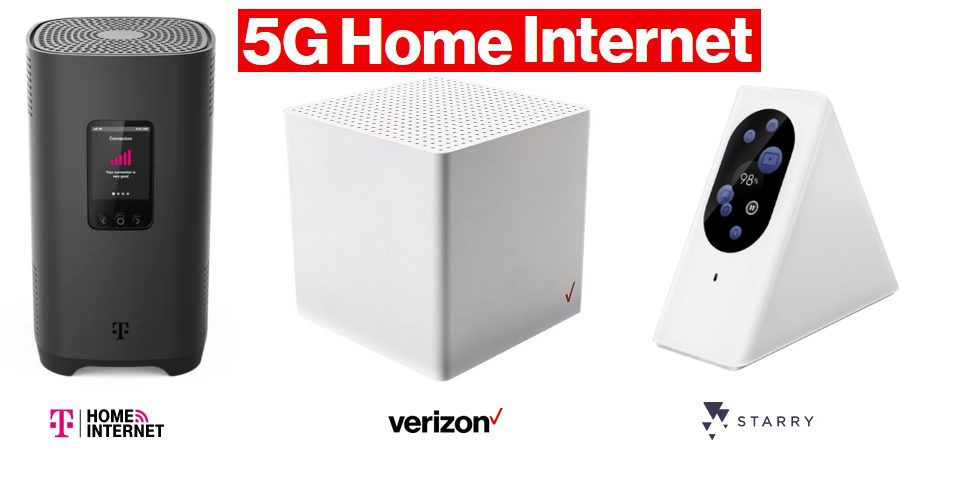Last updated on March 16th, 2023 at 05:36 am
The US market for 5G fixed home internet is becoming more competitive, and major cellular service providers like T-Mobile and Verizon are providing some significant incentives to draw customers. Verizon’s 5G fixes home Internet is available now over to 20 million US homes across 23 states including recently added areas like Colorado, Florida, and New York. As of now, around 50 million Americans in 27 states currently have access to T-Mobile’s 5G Home Internet. AT&T was testing its 5G home internet service in select cities but had not yet launched it for widespread availability, but it does offer 4G home internet for rural customers and businesses.
Starry does not offer 5G home internet service. Instead, they are offering a fixed wireless broadband service that utilized the 5G spectrum band and they call it more than 5G internet service. Starry’s 5G internet services are available in 7 States of the US.

The most reliable and effective solution for your need for the Internet would typically be fixed fiber optic or cable internet if you have the option but yet, 5G Home Internet often comes with benefits like self-installation, no contracts, unlimited data, and more, so let us have a look at various options of 5G fixed home Internet options.
How to decide which 5G Fixed Home Internet is the Best
Choosing the best 5G home internet provider can be a complicated decision and may depend on a number of key factors. Let us discuss a few of them which impact the most.
Coverage Area
If you are living in an area where you don’t find cable or fiber service providers for your internet luckily if you are in the service area of any 5G home internet providers then you may consider it for your home internet service. T-Mobile now has the largest and most ubiquitous 5G infrastructure in the nation, but Verizon is still regarded as having one of the greatest cellular networks in the U.S. This is wonderful for 5G home internet consumers. Starry Internet is only available in a few cities in 7 States. So the first thing to consider is that you must have a strong signal at your location from any of the three 5G home internet service providers.
Pricing and discounts
The cost of equipment and plan will continue to be a key consideration when choosing a 5G home internet service. T-Mobile provides apparently “unlimited” 5G internet speeds with no data cap for a fixed charge of $50 per month. Existing T-Mobile cellular customers can pay $30 per month. The download speed is in the range of 33 to 182 Mbps.
Verizon’s regular 5G home internet plan, which costs $50 per month, has a maximum speed of about 300 Mbps, while its 5G home Plus plan, which costs $70 per month, has speeds of up to 940 Mbps (1Gbps). Existing Verizon wireless cellular customers receive 50% off of plans. The cost of the plans without a cellular phone plan and without auto pay option would be $60 and $80 per month respectively.
If you have an option for an Internet connection from Starry, you may have the most affordable plan for faster data speeds up to 200Mbps in the monthly charge of $30 and $65 otherwise you may also fo for its high-speed “Gigabit” plans for $80 per month.
Contracts, Equipment, and Fees
All three of the 5G home internet providers, T-Mobile, Verizon, and Starry provide services with contracts without yearly commitments, additional costs, or price increases. Fixed 5G providers like Verizon, T-Mobile, and Starry all offer a dedicated modem/router that can handle more connections and faster speeds, in contrast to some 5G home internet services that employ a tethered PC or other device connected to a cellular network.
5G Technology Sub-6 or mmWave
Most 5G service providers use Sub-6 5G technology because it may be quickly implemented by service providers like T-Mobile and Verizon since it only needed minor cellular tower improvements. while millimeter wave 5G (or mmWave) required larger infrastructure changes. The Sub-6 5G uses frequencies below 6GHz while mmWave 5G Data networks transmit at frequencies between 30 and 300 GHz. Radio waves of Sub-6 5G ( frequencies below 6GHz) are in centimeters and have a long-range while Radio waves (frequencies between 30 and 300 GHz) are in millimeters and have a shorter range, but are overall faster. This means your data connection with mmWave is faster as compared to Sub-6 5G technology.
Starry Home Internet is only offered in a few cities by using mmWave 5G technology while T-Mobile currently exclusively offers Sub-6 5G, and Verizon currently offers both mmWave and Sub-6 5G depending on location.
So with the above few key points, many users may find that 5G home internet is less expensive than cable or fiber internet. Companies may be able to give 5G residential internet at the same or even higher speeds than wired connections for less money because they do not need to install or maintain individually-run wires. Some 5G home internet service providers, including Verizon, T-Mobile, and Starry, offer services without an annual contract, which might also save homes money if they do not need to subscribe to service for a full year.
Hopefully, AT&T may launch 5G home internet this year then we will see more choice and competition.


